Monetary reform of Khrushchev - the conscious destruction of the economy
About this article from the resource "Russian portal" with unknown authorship.
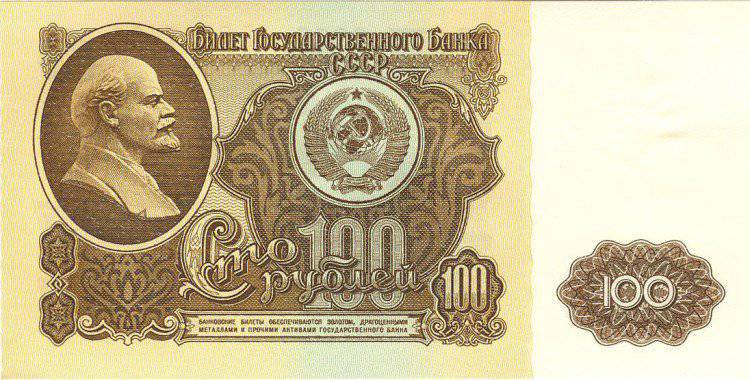
“The monetary reform of 1961 has often been attempted to be represented by an ordinary denomination like the one that was carried out in 1998. In the eyes of the uninitiated, everything looked extremely simple: the old Stalinist "footcloths" were replaced by new Khruschev "candy wrappers", smaller in size, but more expensive at face value. The currency notes of the 1947 sample were exchanged without restrictions on the money of the 1961 sample according to the 10: 1 ratio and the prices of all commodities, wage rates, pensions, scholarships and allowances, payment obligations and contracts were changed in the same ratio. This was supposedly done only "... in order to facilitate monetary circulation and make the money more useful."
However, then, in the sixty-first, few people paid attention to one oddity: before the reform, the dollar was worth four rubles, and after it was held, the course was assigned to 90 kopecks. Many people were naively glad that the ruble became more expensive than the dollar, but if you change the old money to a new one to ten, then the dollar should have been worth not 90, but only 40 kopecks. The same thing happened with gold content: instead of receiving gold content equal to 2,22168 grams, the ruble received only 0,987412 g of gold. Thus, the ruble was undervalued 2,25 times, and the purchasing power of the ruble in relation to imported goods, respectively, decreased by the same amount.
It is not for nothing that the permanent head of the People's Commissariat of Finance, 1938, and then the Minister of Finance Arseny G. Zverev, who did not agree with the reform plan, left 16 of May, 1960 of the year, as head of the Ministry of Finance. He left immediately after the 4 of May 1960 of the year in the Kremlin signed the resolution No. 470 of the Council of Ministers of the USSR "On changing the scale of prices and replacing the current circulating money with new money." This native of the village of Negodyaev of the Klin district of the Moscow province could not but understand what this reform would lead to and did not want to participate in this matter.
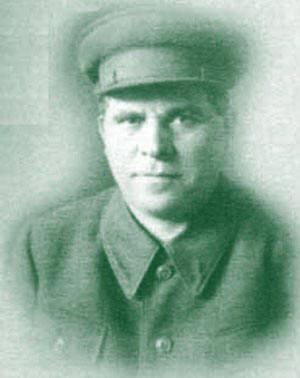
The consequences of this reform were devastating: imports rose sharply, and foreign things, which the Soviet buyer hadn’t really spoiled before, turned into luxury goods.
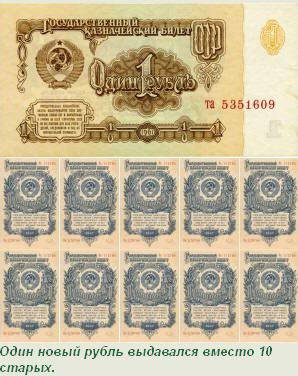
But not only from this suffered the Soviet citizens. Despite all the assurances of the party and the government that only the exchange of old money for new ones takes place, the same as in France the previous year, when de Gaulle introduced new francs, the private market reacted to this reform in a special way: if state prices have changed exactly ten times, then on the market they have changed on average only 4,5 times. The market is not fooled. So, if in December 1960 potatoes were worth a ruble in the state trade, and in the market from 75 kopecks to 1 rubles. 30 cop., Then in January, as was prescribed by the reform, the shop potatoes were sold at 10 kopecks per kilogram. However, the potatoes on the market already cost 33 pennies. Similar things happened with other products and, especially, with meat - for the first time since 1950, market prices have again exceeded store prices.
What did it lead to? And the fact that the store vegetables have dramatically lost in quality. It turned out to be more profitable for zavmagam to merge quality goods with market speculators, put the proceeds in cash and report on the implementation of the plan. The difference in price between the purchase price of the speculator and the state price was put by the storekeeper in his pocket. In stores, however, there remained only what the speculators themselves refused, that is, that it was impossible to sell on the market. As a result, people stopped taking almost all the grocery products, and began to go to the market. Everyone was pleased: the head of the store, and the speculator, and the trade authorities, who had everything in their reports in a normal manner, and with which the head masters, naturally, shared. The only dissatisfied was the people, whose interests were thought of at the very least.
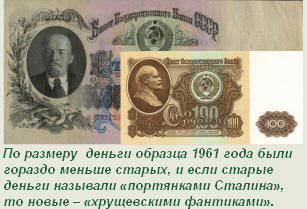
The departure of products from the store to the more expensive market has hurt the welfare of the people. If in 1960 a year with an average salary in 783 of a ruble a person could buy 1044 a kilogram of potatoes, in 1961 with an average salary in 81,3 of a ruble only 246 a kilogram. It was possible, of course, to stand in a two-hour queue, to buy cheap store potatoes, which could be bought 813 kg for wages, but as a result they brought home one rot, and after cleaning remained at a loss.
The rise in prices was not limited to the January jump, but continued in subsequent years. In 1962, potato prices in the markets of large cities of the country amounted to 123% to 1961, in 1963 - to 122% to 1962, and in the first half of 1964 - to 114% to first half of 1963.
Especially difficult was the situation in the regions. While in Moscow and Leningrad the situation in the stores was somehow controlled, then in the regional and district centers many types of products completely disappeared from the state trade.
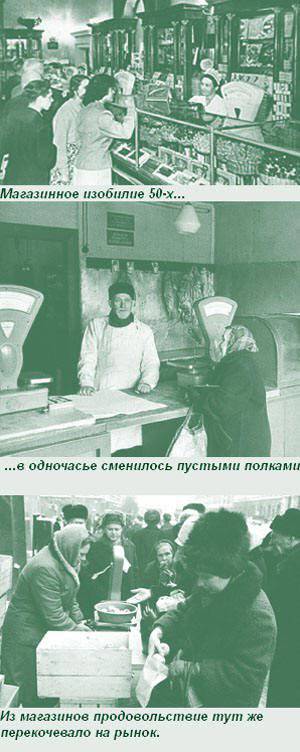
The collective farmers also did not hurry to hand over the products to the state, because the purchasing prices also changed in the ratio of 1: 10, and not 100: 444, as it should be changed, based on the gold and currency parity. Most of the products they also began to export to the market.
The response to this was the consolidation of collective farms, and the mass transformation of collective farms into state farms. The latter, unlike the collective farms, could not export products to the market, but were obliged to hand over everything to the state. However, instead of the expected improvement in food supply, such measures, on the contrary, led to the food crisis of 1963-64, as a result of which the country had to buy food abroad. One of the consequences of this crisis was the removal of Khrushchev, followed by the very same Kosygin reforms.
In the 1962 year, in order to somehow compensate for the outflow of products to the market, it was decided to increase retail prices in the state trade. The decision to raise prices for meat and dairy products was issued by a decree of the Central Committee of the CPSU and the USSR Council of Ministers on May 31 of 1962. However, this price increase further increased prices in the bazaars. As a result, the then prices for the then salaries turned out to be exorbitant. All this caused popular unrest, and in Novocherkassk even led to a large-scale uprising, during the suppression of which 24 people were killed.
A total of 1961 major public appearances occurred in the 64-11 years. For the suppression of eight of them fire was used weapon.
Only during Kosygin reforms, market and store prices managed to level out a little, and in Late Brezhnevskiy times in some places in the markets it was not allowed to raise prices above the maximum set by the administration. Violators lost their right to trade.
That was the beginning of the fall of the economic power of the USSR, and after 30 years after the Khrushchev reform, the Soviet Union ceased to exist.
Why did the party and the government go for a reform in which the ruble became virtually exaggerated? The fact is that in the post-war period in the USSR there was a huge increase in oil production - from 19,436mln t in 1945 to 148 mln t in 1960. And it was then, in the 1960 year, that a decision was made on large-scale oil exports. "Our brotherly countries have long needed oil, and our country has it in abundance. And to whom, if not to help the fraternal countries with oil?", Wrote Pioneer Truth on December 13 on December 1960.
In the early postwar years, exports of petroleum products from the USSR were insignificant; and crude oil until 1948, was not exported at all. In 1950, the share of non-products in foreign exchange earnings was 3,9%. But in 1955, this share rose to 9,6% and continued to grow. However, oil at that time was quite cheap - 2,88 dollars per barrel (See: Oil prices from 1859 to today). At the rate of 1: 4, established in 1950, it was 11 rubles 52 kopecks. The cost of extracting one barrel and transporting it to the destination point averaged 9 rubles 61 penny. In this situation, exports were almost unprofitable. It could become profitable in case it gives more rubles for a dollar. After the reform, the oilmen received almost the same amount in dollars - $ 2.89, but in rubles this amount was already 2 rubles 60 kopecks with the same 96-kopek cost per barrel.
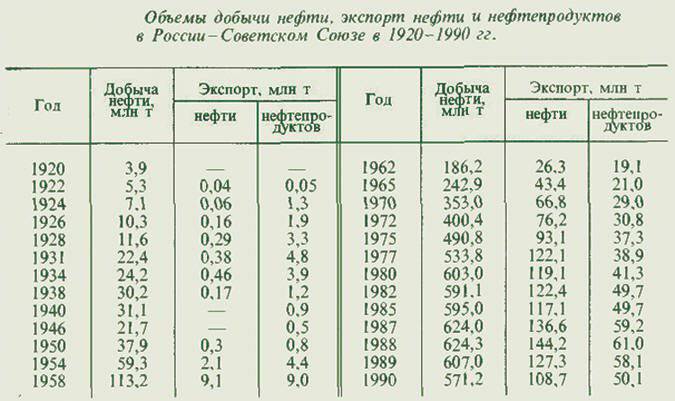
Thus, the monetary reform of 1961 of the year was not at all a simple denomination, such as in France. Unlike the French denomination, during which de Gaulle prepared the ground for the return to France of gold stolen from the French by the Americans in 1942, the Khrushchev reform brought irreparable harm to the economy. 1961’s sly denomination of the year brought the country two misfortunes - dependence on oil exports and a chronic food shortage leading to trade corruption. These two misfortunes and later became one of the main factors that ultimately destroyed the Soviet Union.
The only pleasant moment of the reform was that the copper (bronze) coins of earlier issues were not exchanged, since the cost of minting a single-penny coin was 16 kopecks. However, shortly after the announcement of the reform, the Gostrudsberkass management and trade organizations received a directive prohibiting the exchange of old paper money for copper coins worth 1, 2, and 3 pennies, so that, despite legends, almost no one managed to enrich themselves with the increase in the cost of copper money. ”
Information